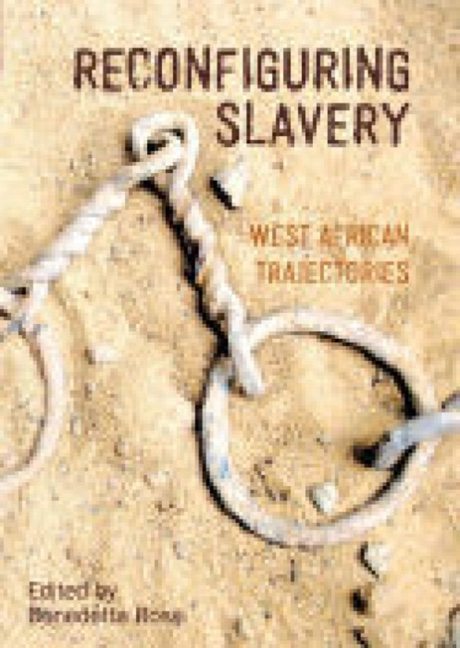Book contents
- Frontmatter
- Content
- List of Figures
- Notes on Contributors
- Preface
- A Note on Language
- Preface to the Second Edition
- 1 Introduction: Rethinking Slavery in West Africa
- 2 Slave Descent and Social Status in Sahara and Sudan
- 3 African American Psychologists, the Atlantic Slave Trade and Ghana: A History of the Present
- 4 After Abolition: Metaphors of Slavery in the Political History of the Gambia
- 5 Islamic Patronage and Republican Emancipation: The Slaves of the Almaami in the Senegal River Valley
- 6 Curse and Blessing: On Post-slavery Modes of Perception and Agency in Benin
- 7 Contemporary Trajectories of Slavery in Haalpulaar Society (Mauritania)
- 8 Slavery and Politics: Stigma, Decentralisation and Political Representation in Niger and Benin
- 9 Slavery and Migration: Social and Physical Mobility in Ader (Niger)
- 10 Discourses on Slavery: Reflections on Forty Years of Research
- Glossary of Foreign Words
- Index
3 - African American Psychologists, the Atlantic Slave Trade and Ghana: A History of the Present
- Frontmatter
- Content
- List of Figures
- Notes on Contributors
- Preface
- A Note on Language
- Preface to the Second Edition
- 1 Introduction: Rethinking Slavery in West Africa
- 2 Slave Descent and Social Status in Sahara and Sudan
- 3 African American Psychologists, the Atlantic Slave Trade and Ghana: A History of the Present
- 4 After Abolition: Metaphors of Slavery in the Political History of the Gambia
- 5 Islamic Patronage and Republican Emancipation: The Slaves of the Almaami in the Senegal River Valley
- 6 Curse and Blessing: On Post-slavery Modes of Perception and Agency in Benin
- 7 Contemporary Trajectories of Slavery in Haalpulaar Society (Mauritania)
- 8 Slavery and Politics: Stigma, Decentralisation and Political Representation in Niger and Benin
- 9 Slavery and Migration: Social and Physical Mobility in Ader (Niger)
- 10 Discourses on Slavery: Reflections on Forty Years of Research
- Glossary of Foreign Words
- Index
Summary
‘The pain of what has happened to my ancestors is very deep’
Let me begin by identifying a network of African Americans who play a key role in the essay that follows. The links between them are set out below, as is their activist-intellectual project and the nature of their involvement with Ghana.
Molefi Kete Asante's The History of Africa: The Quest for Eternal Harmony (2007) is a comprehensive restatement of the author's well-known Afrocentric ideas. The book, produced by a respected academic publisher, is clearly aimed at a scholarly as well as a partisan historical readership. Its Afrocentric agenda proclaims the cultural unity of all African peoples in a historical line of descent from the original black civilisation of ancient Kemet/Egypt. Asante's conceptualisation of the transmission of African ideas and values across time and space is rooted in the core Kemetic/Egyptian principle of Maat. This was the archetypal belief that ‘it was necessary to possess order, balance, harmony, justice, truth, righteousness, and reciprocity’ to hold back ‘chaos in every aspect of life’. To possess Maat conferred strength and unity. By corollary, to lose it fostered weakness and alienation.
Asante's book argues that the centuries-long impact of white European and latterly American interventions in Africa – the Atlantic slave trade, territorial imperialism, neo-colonialism, the neo-liberal world order, a fragmented and alienated diaspora – constitute a calculated subversion of African unity and a sustained assault on Maat. The final section of Asante's book is headed ‘Nothing remains except to do Maat’, and it ends with the Draft of a Preamble to the Constitution of the African Federative State or United States of Africa drawn up under the auspices of the African Union in South Africa in 2002. This declares that Africans are ‘a collective people with long traditions in intensifying a common bond’, and restates the principles of Maat in ‘a commitment to freedom, harmony, order, balance, justice, and reciprocity in all our relations with each other’ (Asante, 2007, 350).
In his book's Acknowledgments, Asante thanks W. E. B. Du Bois and other forefathers of Afrocentrism as well as colleagues in and alumni of the African Studies department he heads at Temple University in Philadelphia.
- Type
- Chapter
- Information
- Reconfiguring SlaveryWest African Trajectories, pp. 45 - 62Publisher: Liverpool University PressPrint publication year: 2009



